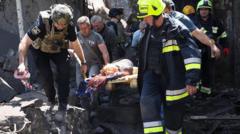In a nation weary from war and economic despair, Iranians express fear over the deepening repercussions of a fragile ceasefire, underscoring their yearning for peace amidst political turmoil.
Fractured Peace: The Iranian Perspective on Ceasefire After Strikes

Fractured Peace: The Iranian Perspective on Ceasefire After Strikes
As a fragile ceasefire emerges after recent conflicts, ordinary Iranians reveal their exhaustion and skepticism about the future.
"Ordinary people are suffering," declared Sirous, an Iranian sharing his insights from Tehran, as he spoke about the recent ceasefire between Iran and Israel after 12 days of intense conflict. He believes that external powers orchestrated the conflict, declaring that while both Iran and the US appear satisfied, it is the Iranian populace left to bear the scars. As per Iran's health minister, death tolls have reached 606, though independent organizations suggest that the impact could be even graver.
Amidst this environment of despair, fear, and flickers of hope, several Iranians expressed their worries about the national ramifications of the conflict. Minoo, a pseudonymous voice of many, highlighted the toll that years of sanctions and a struggling economy have taken on her homeland. “What frightens me,” she explained, “is the combination of devastation due to war with an exhausted economy. We’ve already paid dearly—with our finances and our lives.”
Minoo’s sentiments echoed those of many who feel drained by ongoing strife. “We just want peace. We are exhausted. We're tired of war, of sanctions, and even this ceasefire,” she lamented. “What terrifies me more is the weakened Islamic Republic, which might turn its anger towards us, increasing oppression and executions.”
The regime’s consistent repression of dissent, particularly after the protests of 2022, exacerbates fears. Reports indicate a disturbing number of executions, with over 900 documented last year alone. Journalistic efforts to gather information within Iran remain stifled due to government restrictions, forcing BBC news reporters to connect with citizens via platforms like WhatsApp and Telegram.
Concerns also linger regarding the post-conflict landscape. Mehdi, another pseudonymous Iranian, fears the regime will neglect public needs in favor of military and nuclear ambitions. “They are experts at exploiting tragedy, using loss to stifle opposition,” he stated. “They might promise temporary freedom, but history shows it won’t endure.”
The ceasefire, announced by Donald Trump, commenced on Tuesday but has already faced accusations of violations from both sides, casting doubt on its longevity. Explosions reported in northern Mazandaran province further fueled anxieties. Witnessing the truce unfold, Sara, also using a pseudonym, conveyed her skepticism, voicing doubts about its adherence.
Others like Arman and Kian voiced strong critiques, suggesting the ceasefire was not built on solid ground. "This ceasefire will definitely collapse," Arman remarked. "Israel hasn’t fulfilled its objectives wholesale… the regime must fall.” Kian articulated his suspicion that the ceasefire serves as a ploy to force Iran's leadership out into the open.
Just hours into the ceasefire, tensions flared once more, as the Israeli military alleged missile interceptions from Iran—claims that Iran quickly denied.
As uncertainty looms, the situation remains volatile, ensuring that many Iranians are left watching the skies in anticipation of what tomorrow may bring.























